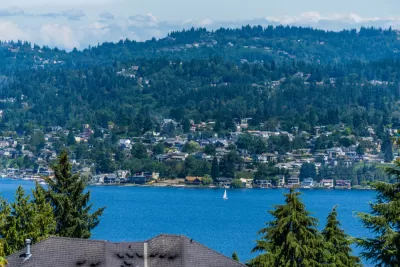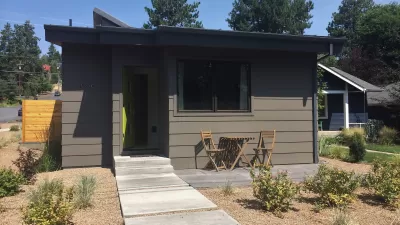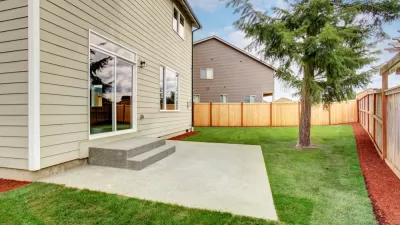Renton, a suburb of Seattle dealing with skyrocketing housing prices like many of the communities in the region, is allowing new density in residential neighborhoods in the form of backyard cottages.

Josh Cohen reports on the example of Renton, Washington, which recently slashed permitting fees in the hopes of spurring new developments of accessory dwelling units (ADUs).
Cohen's coverage notes efforts in Portland, Vancouver, California, and Seattle to loosen restrictions on ADUs before turning the attention on suburbs faced with the same challenges of an abundance of single-family zoning and a dearth of affordable housing options.
Faced with its own need for middle-income or “workforce” housing, the Renton City Council voted in October 2017 to cut ADU permit fees in half. Based on the modest success of the program so far — over the past year there were five applications for new ADU permits versus five total between 2010 and 2017 — the city council voted in mid-November to extend the fee cuts [pdf] until the end of 2020.
Cohen adds more details about the changes:
The council resolution cuts construction permit and impact fees in half for all new ADUs. Doing so brings the permitting costs from about $22,000 per backyard cottage to $11,000. To encourage subdivision developers to include ADUs in their projects, the resolution waives all permit and impact fees for every third ADU built in a subdivision with 10 or more houses.
The article includes more details about the market and political contexts in the city of Renton, and reports some of the initial reactions to the fee reductions.
FULL STORY: Facing high housing prices, Renton pushes backyard cottages

Americans May Be Stuck — But Why?
Americans are moving a lot less than they once did, and that is a problem. While Yoni Applebaum, in his highly-publicized article Stuck, gets the reasons badly wrong, it's still important to ask: why are we moving so much less than before?

Using Old Oil and Gas Wells for Green Energy Storage
Penn State researchers have found that repurposing abandoned oil and gas wells for geothermal-assisted compressed-air energy storage can boost efficiency, reduce environmental risks, and support clean energy and job transitions.

Placekeeping: Setting a New Precedent for City Planners
How a preservation-based approach to redevelopment and urban design can prevent displacement and honor legacy communities.

San Francisco’s Muni Ridership Grew in 2024
The system saw its highest ridership since before the Covid-19 pandemic, but faces a severe budget shortage in the coming year.

Colorado Lawmakers Move to Protect BRT Funding
In the face of potential federal funding cuts, CDOT leaders reasserted their commitment to planned bus rapid transit projects.

Safe Streets Funding in Jeopardy
The Trump administration is specifically targeting bike infrastructure and other road safety projects in its funding cuts.
Urban Design for Planners 1: Software Tools
This six-course series explores essential urban design concepts using open source software and equips planners with the tools they need to participate fully in the urban design process.
Planning for Universal Design
Learn the tools for implementing Universal Design in planning regulations.
Heyer Gruel & Associates PA
City of Moreno Valley
Institute for Housing and Urban Development Studies (IHS)
City of Grandview
Harvard GSD Executive Education
Salt Lake City
NYU Wagner Graduate School of Public Service
City of Cambridge, Maryland





























